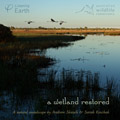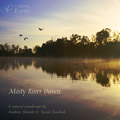

Running Time:
152 min
Release Date:
May 2018
Recording Location:
Cajeput Waterhole on the Fitzroy River, Mornington Wildlife Sanctuary, Kimberley region of northwest Australia
If you like this album,
we also recommend:
Paperbarks by Still Water
It is the dry season in the Kimberley region of far northwestern Australia. The waters of the Fitzroy River flow slowly, forming deep pools that reflecting the sky and the paperbark trees that line its banks. These paperbarks are known as cajeput in the local indigenous language, and have given their name to one of these still water pools.
Dawn has come to Cajeput Waterhole, and the birdlife attracted to this place is in full voice. A rich variety of species can be heard; among them doves, friarbirds, flycatchers, whistlers, bee-eaters, butcherbirds, babblers, wagtails, finches, lorikeets, cuckoo-shrikes, and a variety of honeyeaters. Their voices come from the trees nearby and the opposite riverbank.
Downstream, rapids can faintly be heard, but as the morning progresses and the air warms, these become less noticeable, and the birdsong becomes more spacious. Every now and then a faint splash signals the presence of fish in the nearby pool.
This is a single un-edited recording, allowing you to sit and listen under the cajeput trees on the banks of the river, as birds sing all around in the morning sunlight.
Cajeput Waterhole is a part of Mornington Wildlife Sanctuary, administered by the Australian Wildlife Conservancy. This recording has been made with their support, and documents why this region has such high conservation values.
Andrew comments:
“When I arrive at a location, I set about looking for the optimal spot to place my microphones the next morning. Often I’m undecided, having identified more than one location. Nature can be unpredictable, and this leads to a quandary; with often limited time in the field, which place to choose?
“So I now travel with two recording rigs whenever possible, doubling my chances of capturing a nice recording, and giving me some latitude if one spot turns out to be less productive than the other. It also allows me to take a risk on a location that might turn out to be interesting after all.
“But every now and then, I find a spot so rich that both recordings are equally wonderful. Such was the case at Cajeput Waterhole, where the diversity of birdlife and birdsong was exhilarating. At first, I thought one recording was the highlight, but on further listening to the other, it is equally enjoyable.
“Hence, I’ve chosen to make both available. This is the first, and the second will be published shortly.”
Audio sample of this album
Purchase this
album as:
Digital Album
(for immediate download)
Download this album
for as little as
$7.50 -
View Special Deals
(Prices AU$, exGST)
Mp3:
Mp3 is a universal audio format, playable on iPods, computers, media players and mobile phones.
Mp3 is a compressed format, allowing smaller filesizes, offering faster download times and requiring less storage space on players, but at some expense to the audio quality. Many listeners can't really hear the difference between mp3 and full CD-quality audio, and hence its convenience has lead to it becoming the default option for audio.
Our albums are generally encoded at around 256kbps (sometimes with VBR), balancing optimal audio quality without blowing out filesizes excessively. We encode using the Fraunhoffer algorithm, which preserves more detail in the human audible range than the lame encoder.
Our mp3 files are free of any DRM (digital rights management), so you can transfer them to any of your media technology. You've paid for them, they're yours for your personal use without restriction.
Mp3 files can be burned to disc, either as an mp3 disc, or an audio CD after converting them to a standard audio (.wav or .aif) format first.
FLAC:
FLAC is a high-quality audio format, allowing CD-resolution audio. It is ideal if you wish to burn your files to a CDR, or listen over a high resolution audio system. However files usually require special decoding by the user before playing or burning to disc.
FLAC (Free Lossless Audio Codec) is a LOSSLESS compressed audio format. This means that it preserves the full audio quality of a CD, but optimises the filesize for downloading. Typically, file sizes of around 60% are achieved without any degradation or loss of audio quality from the source files at the CD standard of 16bit/44.1kHz.
Obviously the file sizes are larger than for the mp3 version - usually around 300-400Mb for an album, compared to 100Mb for an mp3 album.
In addition, you'll need to know what to do with the files once you've downloaded them. In most cases you'll want to decode the files to wav or aiff, either to import into programs like iTunes, or burn to CDR. Some programs will play flac files natively.
There is a lot of information about flac online (eg: http://flac.sourceforge.net/)





 Alternate audio link
Alternate audio link 